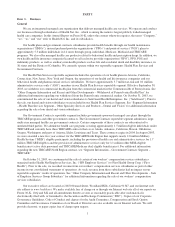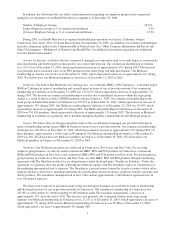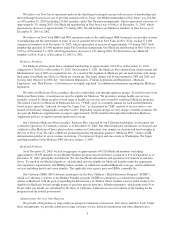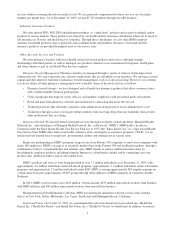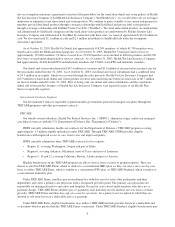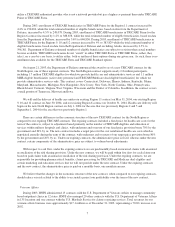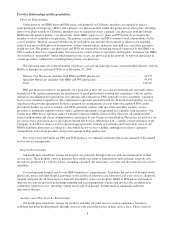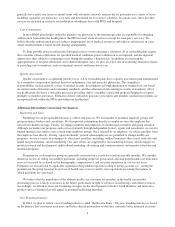Health Net 2003 Annual Report Download - page 12
Download and view the complete annual report
Please find page 12 of the 2003 Health Net annual report below. You can navigate through the pages in the report by either clicking on the pages listed below, or by using the keyword search tool below to find specific information within the annual report.about their health care, based on their own preferences. As the Rosetta Stone allowed Egyptologists to decipher
hieroglyphics, Health Net’s Rosetta Stone suite of products will enable our members to decipher the often bewildering
language of health care. The initiative incorporates three primary elements: Decision Power, a Hospital Comparison
Report and Evidence Based Medicine. Decision Power will provide Health Net members with a broad range of electronic
and telephonic interactive modes of acquiring information about key health care issues. The Hospital Comparison Report
will allow members to compare hospital clinical and cost performance for a variety of common procedures. Evidence
Based Medicine will bring to members substantial data on evidence-based standards of care. We believe that the Rosetta
Stone suite of products could provide us with a differentiated position in the health care marketplace.
Health Net One Systems Consolidation Project
We have initiated a project to convert a number of information systems in our health plan business to a single system
environment. At the completion of the project, we will consolidate various systems into one general ledger system, one
core claims system, one data warehouse system and one core web system. In addition, we will reduce our number of
surround information systems to 16 and consolidate our data centers to a single site with a tested backup facility. Key
actions completed on the Health Net One systems consolidation project to date include consolidation to a single general
ledger, consolidation of health plan portals and conversion of Arizona’s core claims system. In late 2003, we converted to
a common eligibility database and in 2004 plan to convert to a common provider database and to convert the California
and Oregon core claims system.
We believe that completion of the Health Net One systems consolidation project will improve customer/client service
and communication, realize operational and cost efficiencies and improve our decision making capability. In addition, we
believe that completion of the project will enable us to improve our claims turnaround time, auto adjudication rate and
electronic data interchange and Internet capabilities. However, there are risks associated with the Health Net One systems
consolidation project. See “Risk Factors – The failure to effectively maintain our management information systems could
adversely affect our business.”
Competition
We operate in a highly competitive environment in an industry currently subject to significant changes from business
consolidations, new entrants in the marketplace, new strategic alliances, legislative reform and market pressures brought
about by a better informed and better organized customer base. Our HMOs face substantial competition from for-profit
and nonprofit HMOs, PPOs, self-funded plans (including self-insured employers and union trust funds), Blue Cross/Blue
Shield plans, and traditional indemnity insurance carriers, some of which have substantially larger enrollments and greater
financial resources than we do. The development and growth of companies offering Internet-based connections between
health care professionals, employers and members, along with a variety of services, could also create additional
competitors. We believe that the principal competitive features affecting our ability to retain and increase membership
include the range and prices of benefit plans offered, size and quality of provider network, quality of service,
responsiveness to user demands, financial stability, comprehensiveness of coverage, diversity of product offerings, and
market presence and reputation. The relative importance of each of these factors and the identity of our key competitors
varies by market. Over the past several years, a health plan’s ability to interact with employers, members and other third
parties (including health care professionals) via the Internet has become a more important competitive factor. To that end,
we have made technology investments to enhance our electronic interactions with third parties. We believe that we
compete effectively against other health care industry participants.
Our key competitors in California are four large health plans: Kaiser Permanente, Blue Cross of California,
PacifiCare Health Systems and Blue Shield of California. Kaiser is the largest HMO in California and Blue Cross of
California is the largest PPO provider in California. All together, these four plans and Health Net account for a majority of
the insured market in California. There are also a number of small, regional-based health plans that compete with Health
Net primarily in the small business group market segment. The combined membership for these regional plans constitutes
approximately 16% of the insured market in the state.
Our largest competitor in Arizona is Blue Cross/Blue Shield. Our Arizona HMO also competes with United
Healthcare, CIGNA, PacifiCare, Aetna and Humana. Our Oregon HMO competes primarily against other HMOs
including Kaiser, PacifiCare of Oregon, Providence, Regence Blue Cross Blue Shield and Lifewise, and with various
PPOs.
10



